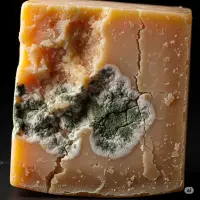Cheese curds are illegal in some specific areas of USA inlcluding Minnesota due to health and safety regulations. Similarly, there’re also a ban of consuming Epoisses cheese at some region of USA.
At Wisconsin, cheeses are forbidden to consume on Tuesday, not the other days. However, the regulations require that cheese curds be made with pasteurized milk to prevent the spread of harmful bacteria.
Introduction on Why are Cheese Curds Illegal
Despite this, unpasteurized cheese curds are still legal in some regions, as long as they are aged for a specific period. Cheese curds have been a popular snack for many years, especially in the Midwest and Canada.
These little nuggets of cheese are known for their squeaky texture and are often enjoyed deep-fried or served with various seasonings.
However, in certain regions, cheese curds made with unpasteurized milk are illegal due to concerns about food safety and the potential for harmful bacteria to be present in raw milk. While the regulations can be frustrating for cheese enthusiasts, they are in place to protect consumer health and well-being.

Why are Cheese Curds Illegal: Illegality Controversy Explored
For cheese enthusiasts and food lovers, the illegality of cheese curds in some jurisdictions can be quite perplexing. Cheese curds, known for their unique taste and texture, have sparked a controversial debate regarding their legality.
In this article, we dive into the legal backdrop of cheese curds in different jurisdictions and explore the factors that drive this controversy.
Understanding The Basic Concept Of Cheese Curds
Cheese curds are the fresh, young form of cheese before it is pressed into molds and aged. These squeaky, flavorful morsels are popular in many regions, especially in Wisconsin, where they are considered a staple snack. The unique texture and mild taste make them a delightful treat for many cheese connoisseurs.
The Legal Backdrop Of Cheese Curds In Different Jurisdictions
When it comes to the legality of cheese curds, different jurisdictions have varying regulations and restrictions. This has led to confusion and controversy surrounding their sale and distribution. In some places, regulations require pasteurization and specific aging processes for cheese products, which may conflict with the traditional methods of preparing cheese curds.
Factors Driving The Controversy
- Misunderstanding of traditional cheese-making techniques: The controversy often arises from a lack of understanding of traditional cheese-making techniques and the unique characteristics of cheese curds.
- Regulatory discrepancies: Varied regulations and lack of standardized guidelines across different jurisdictions contribute to the controversy surrounding the legality of cheese curds.
- Cultural significance: In regions where cheese curds hold cultural significance, restrictive regulations may be met with resistance from local communities.

Credit: reddit.com
Origins Of Cheese Curd Restrictions
Many cheese lovers may be surprised to learn that cheese curds are not legal in some parts of the world. The origins of cheese curd restrictions can be traced back to a combination of food safety concerns and past incidents that have directly impacted current laws. Understanding the underlying factors behind the legality issues surrounding cheese curds sheds light on why this popular and versatile dairy product faces legal restrictions in certain regions.
Food Safety Concerns Behind The Legality Issues
Food safety is a primary consideration in the regulation of cheese curds. The production and handling of cheese curds carry inherent risks, such as contamination and bacterial growth.
Thus, regulators have implemented strict guidelines to mitigate these risks and uphold public health standards. One of the pivotal concerns is ensuring that cheese curds are produced, stored, and transported under conditions that minimize potential health hazards for consumers.
How Past Incidents Have Shaped Current Laws
Past incidents involving foodborne illnesses and outbreaks linked to cheese curds have directly influenced the formulation of existing laws and regulations. Instances of contamination or improper handling have led to legislative and regulatory responses aimed at preventing similar occurrences.
Why Are Cheese Curds Illegal: Safety Measures
When it comes to the legality of cheese curds, safety measures play a critical role. While cheese curds are a popular dairy delicacy in many regions, there are specific regulations and safety protocols that determine their legality. Understanding the safety measures behind why cheese curds are illegal sheds light on the importance of these regulations in ensuring food safety and quality.
Pasteurization And Its Role In Cheese Curd Legality
Pasteurization is a key factor in the legality of cheese curds. This process involves heating milk to a specific temperature to eliminate harmful bacteria and pathogens. In many regions, the sale of unpasteurized dairy products is prohibited due to the potential health risks associated with consuming raw milk and cheese.
As a result, cheese curds made from unpasteurized milk may not meet safety standards and are therefore deemed illegal in certain areas. The emphasis on pasteurization underscores the commitment to providing consumers with safe and wholesome dairy products.
Government Regulations On Cheese And Dairy Products
Government regulations play a pivotal role in ensuring the safety and quality of cheese and dairy products, including cheese curds. Stringent regulations are in place to monitor the production, handling, and distribution of dairy products to safeguard public health.
These regulations encompass various aspects such as hygiene practices, storage conditions, labeling requirements, and product testing. Adhering to these regulations is essential for cheese curd producers to attain legal status for their products, demonstrating compliance with established safety standards.
Impact On Cheese Curd Producers
Cheese curds, a beloved snack for many, have faced legal restrictions in various regions, leaving cheese curd producers to grapple with the impact. From challenges faced by small-scale cheese makers to the economic implications of cheese curd restrictions, the consequences are significant.
Challenges Faced By Small-scale Cheese Makers
Small-scale cheese makers face numerous challenges due to the restrictions imposed on cheese curds. Limited market access is a major hurdle, as these producers are often unable to distribute their cheese curds beyond local markets due to regulatory constraints.
Additionally, the cost of compliance with regulations can be burdensome for smaller producers, depriving them of the opportunity to compete on a level playing field with larger manufacturers. This leads to reduced revenue and stifled growth for small-scale cheese makers.
The Economic Implications Of Cheese Curd Restrictions
The restrictions on cheese curds have several far-reaching economic implications that affect not only the producers but also the broader industry and local economies. One of the most significant impacts is the loss of market expansion opportunities.
By being unable to sell their products in regions where cheese curds are restricted, producers miss out on the chance to grow their customer base and increase their revenues.
Uncovering The Controversy: Consumer Perspective
Many consumers are left puzzled as to why cheese curds are illegal in certain areas. The controversy surrounding the ban has sparked public debate and calls for a change in legislation. Understanding the consumer perspective sheds light on the public’s perception and demand for legal change, as well as the advocacy and opposition groups involved in the cheese curd debate.
Public Perception And Demand For Legal Change
The public perception of cheese curds has evolved over time, with many individuals expressing a strong desire to see the ban lifted. There is a growing demand for legal change, fueled by the increasing popularity of cheese curds as a delectable snack and ingredient in various dishes.
Consumers are vocal about their frustration with the restrictions, citing the accessibility of cheese curds in neighboring regions and the perceived outdated rationale behind the prohibition.
Advocacy And Opposition Groups Within The Cheese Curd Debate
Advocacy groups have emerged to champion the cause of legalizing cheese curds, leveraging social media, petitions, and community outreach to garner support. These groups highlight the economic benefits and cultural significance of cheese curds, while also advocating for stringent safety and quality standards.
On the flip side, opposition groups raise concerns about potential health risks, regulatory challenges, and the impact on existing dairy industries. The cheese curd debate remains heated, pitting advocates and opponents against each other in a battle for legislative change.
Frequently Asked Questions Of Why Are Cheese Curds Illegal
Why Are Cheese Curds Illegal In Some Places?
In some places, cheese curds are illegal due to regulations on unpasteurized dairy products.
Are Cheese Curds Safe To Eat?
Yes, cheese curds are safe to eat if they are made from pasteurized milk.
What Are The Health Benefits Of Cheese Curds?
Cheese curds are a good source of calcium and protein and can be beneficial for bone health.
How Are Cheese Curds Different From Regular Cheese?
Cheese curds are young cheddar cheese in its natural, random shape before being pressed into molds.
Can You Make Cheese Curds At Home?
Yes, cheese curds can be made at home using pasteurized milk and a few simple ingredients.
What Causes Cheese Curds To Squeak When Eaten?
The squeaky texture of cheese curds comes from the protein strands rubbing against the enamel of your teeth.
What Dishes Can You Make With Cheese Curds?
Cheese curds can be used in poutine, salads, pasta, or enjoyed on their own as a snack.
Where Can I Find Legal Cheese Curds To Purchase?
Legal cheese curds can be found in local dairy stores, farmers’ markets, and specialty cheese shops.
Conclusion
The legality of cheese curds is a complex issue with historical and regulatory roots. While some regulations aim to ensure food safety, they can also limit traditional practices and stifle small-scale producers. As consumers, understanding the reasons behind these laws can lead to informed discussions and potential advocacy for change.














